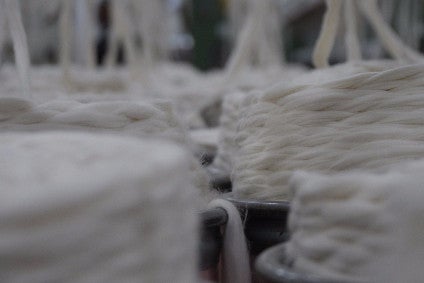
More than half a billion tons of cotton were certified according to the Cotton made in Africa (CmiA) standard in 2018 – helping to increase the volume of sustainably produced cotton by almost 17% compared with the previous year.
With a total of 580,000 tons of cotton certified, some 46 international fashion brands and textile companies now purchase CmiA cotton – amounting to 103m textile items carrying the CmiA label. The Otto Group is the largest buyer, and its Bonprix fashion brand heads the list with around 93% of the cotton purchased and processed by Bonprix being CmiA-certified

Discover B2B Marketing That Performs
Combine business intelligence and editorial excellence to reach engaged professionals across 36 leading media platforms.
Founded in 2005, 1m smallholder farmers from ten African countries are now part of the initiative and have been trained in sustainable and efficient farming methods. In 2018, demand for CmiA cotton on the market rose by more than 14% compared to 2017.
“With Cotton made in Africa, textile companies get more than just cotton. They show that sustainability and profitability go very well hand in hand,” says Tina Stridde, managing director of CmiA. “At the same time, international textile companies and brands are strong partners for smallholder farmers. For each textile piece, they pay licensing fees which finance the work in Africa. We are pleased that we have been able to successfully expand the demand for CmiA in the market thanks to 46 retailers and fashion brands.”
CmiA is working with smallholder farmers in Burkina Faso, Cameroon, Côte d’Ivoire, Ethiopia, and Ghana, as well as in Mozambique, Tanzania, Uganda, and Zambia. With the addition of new partners in Nigeria and Benin, the initiative expands its network from the 2018/2019 season.
More than 100 registered spinning partners and textile producers worldwide work with CmiA in the textile chain – and 85 have been registered in 2018.

US Tariffs are shifting - will you react or anticipate?
Don’t let policy changes catch you off guard. Stay proactive with real-time data and expert analysis.
By GlobalDataCmiA, which now certifies about 37% of the cotton produced by smallholder farmers in sub-Saharan Africa, says its cotton is processed in 19 textile production markets worldwide, with seven in Africa.
The top buyers of CmiA cotton
German e-commerce giant Otto Group is the largest buyer with Bonprix heading the list.
“The close collaboration with Cotton made in Africa is an important leverage for us in achieving our goal of exclusively demanding sustainably produced cotton by 2020,” says Stefanie Sumfleth, head of quality management, corporate responsibility and digital product development at Bonprix. “We are convinced that together with CmiA, we make a valuable contribution to protecting people and the environment.”
Other major buyers of the sustainably produced cotton are the Rewe Group, Tchibo, Aldi Süd, and Asos, as well as Ernsting’s family, Vlisco Group, Engelbert Strauss, and Bestseller. In addition to the big players, smaller fair fashion brands such as Hiitu, Cooee Kids, and Weaverbirds also rely on the sustainability label. Aldi Nord recently joined as a new licensing partner.
All textile companies pay license fees to the initiative to use the certified cotton. CmiA reinvests the money in the farming regions to fund, among other things, the costs of certification.
In 2018, 26 regular audits took place, 12 in the field and 14 in the ginneries where the cotton fibre is separated from the seeds. EcoCert and AfriCert conducted the certifications on behalf of the Aid by Trade Foundation (AbTF), with a total of 19 African auditors deployed in 2018.
Meanwhile, as part of the CmiA Community Cooperation Program, numerous projects to support village communities were implemented in close cooperation with certified cotton companies in 2018, including a total of EUR254,000 paid in 2018 as funds for school projects, income-generating measures for women or access to clean drinking water.
“It is the courage and strength of our partners in Africa and around the world that spurs us on and motivates us every day to continue working with them on the success of our initiative and that allows us to look to the future with great optimism,” says CmiA founder Michael Otto.





